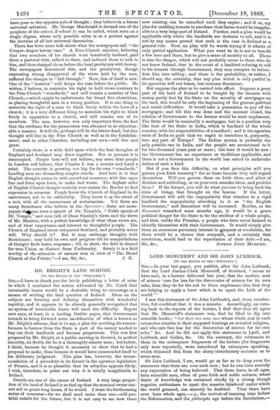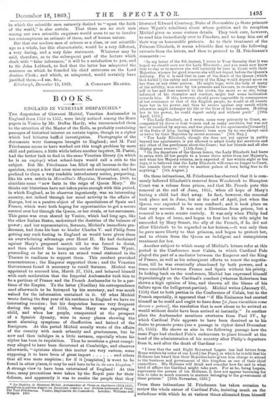LORD MONCREIFF AND SIR JOHN LUBBOCK.
[TO THE EDITOR OF THE "SPECTATOR.']
SIR,—In your last paper, you publish, after Sir John Lubbock,, that the Lord Justice Clerk Moncreiff, of Scotland, " seems to have said, in a lecture delivered last year, that the modern men of science care far less for the discoveries of science for its own sake, than they do for the not to them unpleasant idea that they are helping to apply a lever which is to upset the faith of the " I saw this statement of Sir John Lubbock's, and, from recollec- tion, felt confident that it was a mistake. Accordingly, on turn- ing back to the reports of the lecture, I find that they all agree that Mr. Moncrieff's statement was, that he liked to dip into scientific books ; " bat there are some men whose whole zest in such researches consists in their supposed bearings on revealed religion, and who care fare less for the discoveries of science for its own sake," &c. And he did not apply this statement to Lyell, and Lubbock, and Geikie, &c. On the contrary, the references to them in the subsequent fragments of the lecture (for fragments- only were reported), were introduced by extempore speaking, which disjoined this from the sharp introductory sentence as to some men.
Sir John Lubbock, I see, would go so far as to deny even the statement that there are some such men ; but he can have scarcely any expectation of being believed. That there have, in all ages, been scientific men, often of pure faith and noble natures, whose desire of knowledge was sustained chiefly by a strong though negative enthusiasm to upset the massive falsehood under which the world groaned, can scarcely be doubted. That there have even been whole ages,—e.g., the revival-of-learning time before the Reformation, and the philosophe age before the Revolution,— in which the scientific men earnestly desired to " upset the faith of the world," is also certain. That there are no such men among our own scientific enquirers would seem to me to involve too contemptuous an estimate of them, and of human nature.
But that our modern men of science as a class, or our scientific age as a whole, has this characteristic, would be a very different, a very daring, and a very false statement. Whatever may be said, therefore, as to the subsequent part of the lecture which -dealt with "false inferences," it will be a satisfaction to you, and to Sir John Lubbock, to find that the latter has misquoted the sentence on which he founded his chief strictures on the Lord Justice Clerk ; and which, as misquoted, would certainly have justified them.—I am, &c.,







































 Previous page
Previous page